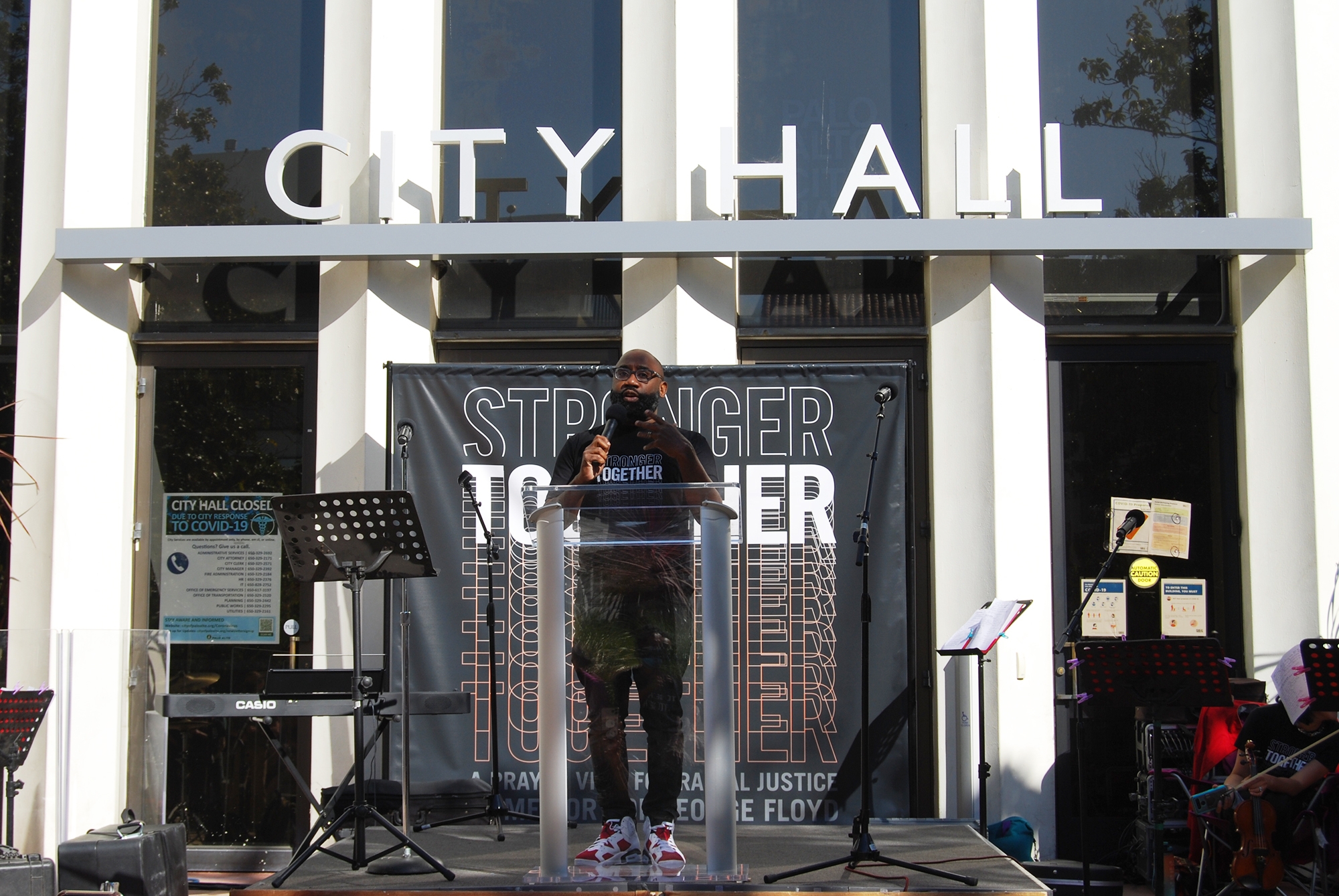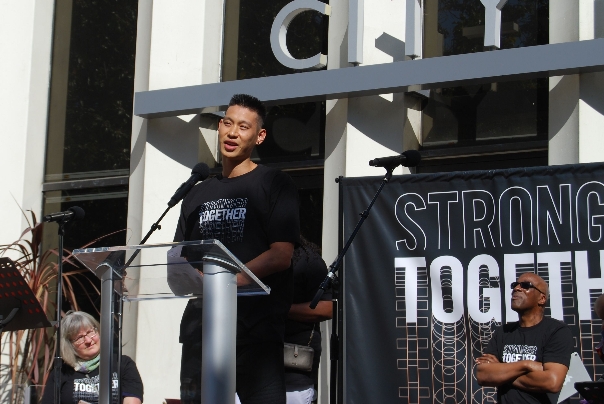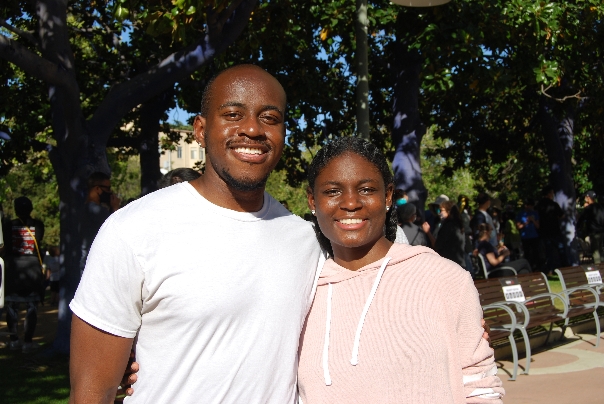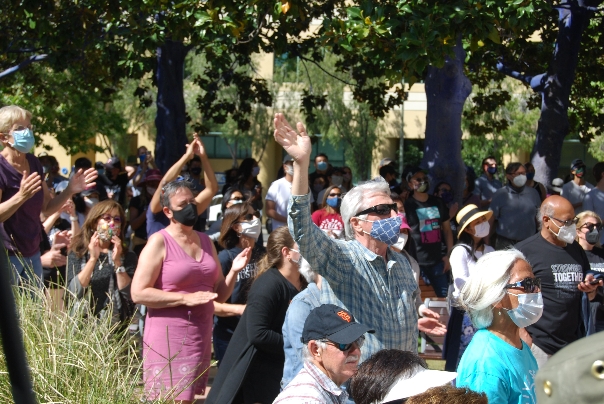With hands lifted up and voices crying out, leaders of numerous Midpeninsula churches on Saturday led a spiritual rally outside Palo Alto City Hall to mark one year since the murder of George Floyd.
It was the same plaza to which outraged residents marched last summer to condemn police brutality and urge reform following the May 25, 2020, murder of Floyd, who was pinned under the knee of Minneapolis police officer Derek Chauvin and unable to breathe for more than nine minutes.
There are times for marches and protests, but there's also a time for prayer, Palo Alto Vineyard Church Pastor Susan Van Riesen told the diverse crowd of several hundred people, who stood in the bright, late-afternoon sunshine.
Racial injustice "is not just a societal issue or a political issue or a systemic issue. It is those things. But … it is (also) a spiritual issue, one that all people of faith ought to engage (in) and take seriously."
At times, the event sounded like a revival, as attendees shouted "Amen!" and "Bring it!" to encourage the speakers. Among those speaking was NBA basketball player Jeremy Lin, who grew up in Palo Alto and has spoken openly about his Christian faith. He shared a prayer for peace in the face of racism and discrimination.
"Give peace today to all of us who suffer mistreatment and wrongdoing, as members of communities targeted by hatred. Release your peace to flood the hearts of the confused, fearful, angry, outraged and those who feel forgotten and invisible. ... Allow the work of peace to begin within us," Lin said.
In contrast to the Black Lives Matters protests that filled local streets last year, Saturday's rally didn't call for specific governmental changes but focused more on urging attendees to continue the momentum of the past year by boldly speaking out against wrongs and standing up for those who are victimized.
The Rev. Kaloma Smith of University AME Zion Church in Palo Alto exhorted attendees to be courageous in the quest for justice.
"I need the believers of God not to fight on your own energy, but to lean into God and know that he's going to empower you," he said, to applause and shouts from the crowd, "because we have a world that needs changing."
"God … is going to require believers that are absolutely bold in their declaration, bold in calling for justice, bold in standing for issues, bold in standing for the brokenhearted, bold in standing for those that are oppressed and marginalized. Those that will stand in a city hall … and say 'We need justice in this world.'"
Amid the gathering at King Plaza, listening to Smith and the others, were Onyi Ozoma and Seneca Friend, who said they had been walking by and were drawn to the event by the sound of music.
They reflected on progress toward racial equality that has been made since last summer and on the continuing need for improvement.
"There's definitely been progress in terms of inducing action. I think that is the biggest thing," Ozoma said, citing the rethinking of funding for law enforcement agencies and structural changes that have been made within institutions. "There's progress in that regard, but definitely still it's early on the path."
Friend agreed that progress has been achieved but noted that it took Floyd's death for some people to realize that action was desperately needed.
"We had a conversation with some other friends a few weeks ago who said the murder of George Floyd was really a wake-up call to them — like, 'Oh, racism still exists,'" Friend said. "And that was something that caused them to be a little bit more proactive and critical in their thinking and in how they treat other people.
"And so I do believe that progress is being made, in that people are being more vocal. People are doing things; people are organizing in great ways," Friend said. "So I'm excited and hopeful."
For many, one reassurance that police brutality will not continue to go unpunished was the April 21 conviction of Chauvin of second-degree unintentional murder, third-degree murder and second-degree manslaughter in the death of Floyd, who pleaded more than two dozen times "I can't breathe" before he lost consciousness and died.
Chauvin faces up to 40 years in prison and is scheduled to be sentenced in June, although his attorney has requested a new trial, alleging Chauvin had been denied a fair trial.
Local elected leaders in the past year have examined policing practices with the aim of curbing the use of excessive force and promoting de-escalation of situations in order to reduce the number of deadly officer-involved shootings.
The Palo Alto City Council reviewed and revised use-of-force policies in the Police Department and expanded a ban on chokeholds and carotid holds to include any restraint technique that is "deliberately applied for the purpose of restricting blood flow or air flow to the head or neck."
The revised policy also includes a new section on de-escalation techniques, including a list of alternatives to force that officers should consider, such as taking "as much time as reasonably necessary to resolve the incident, without having to use force, if feasible."
The city has also supported the creation of public art to signal its commitment to racial justice and commissioned a history of Black and brown communities in Palo Alto, a report that the Human Relations Commission presented earlier this year. The city is also reviewing its hiring practices and is planning to launch "community circles" that will allow residents to meet in small groups to talk about race.






Comments